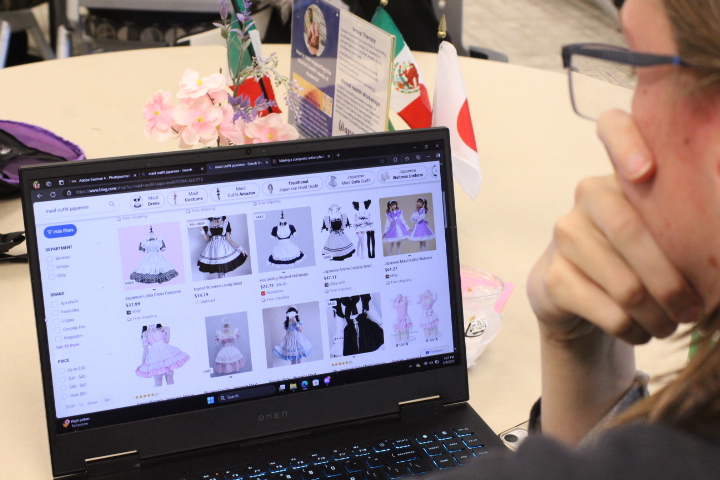
Daniel Michael
Ryan Gentry, the Vice President of Japan Club (GVL), browses the wide web for uniforms to supply his dedicated staff members.
On Apr. 18, the Japan Club (GVL) will be hosting a Maid Café in Nesbitt 4201 from 2 – 5 p.m. for all to attend. The event will feature free Japanese-themed foods such as fruit sandwiches, onigiri, melon soda and omurice while supplies last.
Alongside the variety of food that will be available, members of the club will be adorned in maid outfits and provide top-notch customer service for those who choose to attend the café. Visitors can also take up a “private room” for karaoke with a maid.
“The point of this event is to bring UNG’s populous together through a popular Japanese hang-out spot, a maid café! A place made for friends and family alike.” – Ryan Gentry, Japan Club (GVL) Vice President
Ryan Gentry, the Vice President of Japan Club (GVL), shared his great enthusiasm for the event and the possibility of sharing “one of Japan’s biggest nightlife and daytime attractions.”
The concept of a Maid Café originates from Akihabara, a district in Tokyo famous for its association to anime and games, where the first café opened in 2001 named Cure Maid Café.
Customers who visit this kind of establishment will be treated as a “master or mistress” by the maids and will be taken care of as if they were in a private home.
Maids who work in the industry tend to have a particular fondness for “otaku” culture and find the work fun for allowing them to be expressive in a safe environment. It is common sense in these places that maids are not to be bothered, lest the customer be kicked out for harassment.
Gentry has confirmed that a similar rule will be put in place to prevent anything from happening amongst the maids and customers.
Incidentally, while Akihabara may be home to many “cosplay cafés,” places where staff would dress in costumes and serve customers normally, Maid Cafés have certain rituals and etiquette that are followed to provide an optimal experience.
Rituals that are practiced in cafés include live performances, food art, games with maids and spells to make food taste better.
One such spell that the Japan Club will be utilizing will be “Oishiku nare, moe moe kyun!”, a spell used to make the dishes more delicious.
Members of the Japan Club are looking forward to the event and working their hardest to serve their fellow scholars the best possible experience that they can.